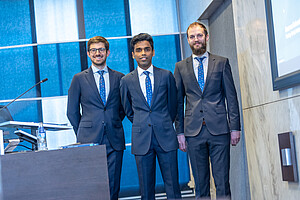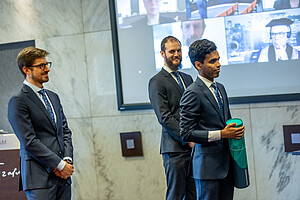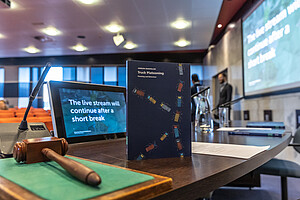PhD Defence Anirudh Bhoopalam

In his dissertation Anirudh identified various new transportation planning problems that arise in truck platooning. He developed methods to plan platoons and show that simple platoons with two trucks, with each truck being part of a single platoon in its journey, already capture most of the platooning benefits. He extended these methods to study the effect of platooning on strategic network design. In addition, this dissertation looks at how truck drivers perceive platooning technology. They foresee that platooning will eventually become a reality but believe it will have a negative impact on the quality of their work and their job satisfaction. Anirudh defended his dissertation on Thursday, 16 December at 10:30h. His supervisors were Prof. Rob Zuidwijk (RSM) and Dr. Niels Agatz (RSM). The members of the Doctoral Committee were Prof. Bart van Arem (TU Delft), Prof. Rommert Dekker (ESE), Dr Marie Schmidt (RSM), Dr Martin Savelsbergh (Georgie Tech), Prof. Caspar Chorus (TU Delft), and Dr. Jordan Srour (Lebanese American University).
About Anirudh Bhoopalam

Anirudh Bhoopalam was born in Bangalore, India. After his schooling, he studied Industrial Engineering and Management, where he picked up an interest in transportation. To learn more, he moved to the Netherlands in August 2014 to pursue a masters degree in Transport, Infrastructure, and Logistics at the TU Delft. Two days after graduating, Anirudh joined the department of Technology and Operations Management at the Rotterdam School of Management, Erasmus University, under the supervision of Prof. Rob Zuidwijk and Dr. Niels Agatz.
Anirudh's research interests include the design, analysis, and optimization of transport systems. His work has been published in Transportation Research Part B and has been presented at several international conferences, including the INFORMS Annual Meeting, International Conference of German Operations Research Society, European Conference on Operational Research, and Triennial Symposium on Transportation Analysis. He has also served as an ad-hoc reviewer of various journals, such as Transportation Research Part B, Transportation Research Part E, and the European Journal of Transport and Infrastructure Research.
Thesis Abstract

Truck platooning is often thought of as the first implementation of automated driving in an open environment. A truck platoon is a set of virtually linked trucks that drive closely behind one another. Benefits of truck platooning include cost savings, reduced emissions, and more efficient use of road capacity. To fully reap these benefits in the initial phases of technology deployment, careful planning of platoons based on trucks’ itineraries and time schedules is required. This dissertation identifies various new transportation planning problems that arise in truck platooning. We develop methods to plan platoons and show that simple platoons with two trucks, with each truck being part of a single platoon in its journey, already capture most of the platooning benefits. We extend these methods to study the effect of platooning on strategic network design. In addition, this dissertation looks at how truck drivers perceive platooning technology. They foresee that platooning will eventually become a reality but believe it will have a negative impact on the quality of their work and their job satisfaction.
View photos of Anirudh's PhD Defence
Photos: Chris Gorzeman / Capital Images


